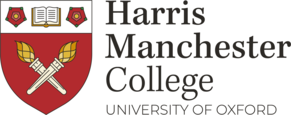Professor J. E. Carpenter and his Library
Professor J.E. Carpenter and his Library
Carpenter and his Library

A photograph of Carpenter with the reflection of his Library shown faintly in the glass
‘The Committee ...gratefully acknowledges…a gift of very special value to the College Library from Dr. Carpenter of his large collection of books dealing with the subject of Comparative Religion. By this gift the Library becomes one of the best equipped in Oxford in this branch of literature. ’
These sentences in the 1922 Annual Report officially record the donation of the Library of Professor Joseph Estlin Carpenter (1844-1927) to College. The 1922 intake of books was only a proportion of the items that we were eventually to receive, the rest arriving in the Library following his death in 1927.

A shelf of texts on Buddhism from the early 20th century in the Carpenter Library
The Carpenter Library is one of the hidden treasures of the Library. Made up of over 4,500 items, covering the broad area of comparative religion, it has material relating to folklore, anthropology, mythology, philosophy and archaeology. It also contains items that focus on the world’s major faiths with a particular emphasis on religions from the Indian subcontinent and parts of Asia. While it has been added to over the years, the bulk of the collection remains Carpenter’s working Library, and so provides a fascinating glimpse of what key works were required in the emerging discipline of comparative religion in the late nineteenth and early twentieth century.
Joseph Estlin Carpenter had long been associated with the College, coming as a student in 1863, before moving on to be a tutor, a Vice-Principal, the Principal and finally, once he retired, the President. He was the Wilde lecturer in Comparative Religion at the University as well as the first member of Manchester College to serve on the University’s Board of Theology. Extremely active in Unitarian circles, he was variously President of the B&FUA, President of the National Conference, a Dr Williams Trustee, and secretary for the London Domestic Mission. He was also very involved in raising funds and pensions for active and retired ministers.
While he held many official positions, it is for the breadth and depth of his scholarship that he was celebrated for during his lifetime. C. H. Herford noted in his preface for Joseph Estlin Carpenter a memorial volume, that Carpenter was ‘a scholar, in the three vast fields of the Old and New Testament, Buddhism and Comparative Religion, [who] left a deep and definite impress upon each.’. J.H. Weatherall notes in ‘I met Estlin Carpenter’, an article in the 1945 Inquirer ‘, ‘In modern scholarship it is an axiom that a man who knows two subjects can be nothing but an amateur in either. Carpenter was one of the exceptions…. In his Old Testament work he came at the right time to expand a new and consequential reconstruction of Israelite history. It was the same with Buddhism, and with Comparative Religion: he was amongst the first, he stayed there, exfoliating new and sometimes startling perceptions’.
Carpenter’s wider reputation has faded over the years, but he remains known within College thanks to the Carpenter Library and the portraits that hang on our walls. (One of his portrait hangs in the Arlosh Hall, one in the Warrington Room, and another in the Library stacks.)
In addition to his Library, we have a range of archival material that relates to him. The material contains letters, notebooks of his lectures and sundry other items. One particular small box in the archive provides an insight into the breath of his interests and the longevity of his connection with College. In this box we have letters from various eminent academic, including Tylor and Frazer, concerning the 1908 Oxford Congress on the History of Religions. (Carpenter was joint secretary for this major Congress that had over 600 delegate attend from across the world). The box also contains papers relating to the Frances Power Cobbe Memorial fund, a handwritten examination paper for Ecclesiastical History for College students, and a letter to James Martineau from 1875(?) about admitting women to lectures while the College was in London.
While the areas of scholarship he was involved in have evolved substantially and changed considerable in the years since he died, his Library and the archival materials relating to him are worth further exploration.

A detail of a letter to Carpenter from students and staff of College on the occasion of his 80th birthday



